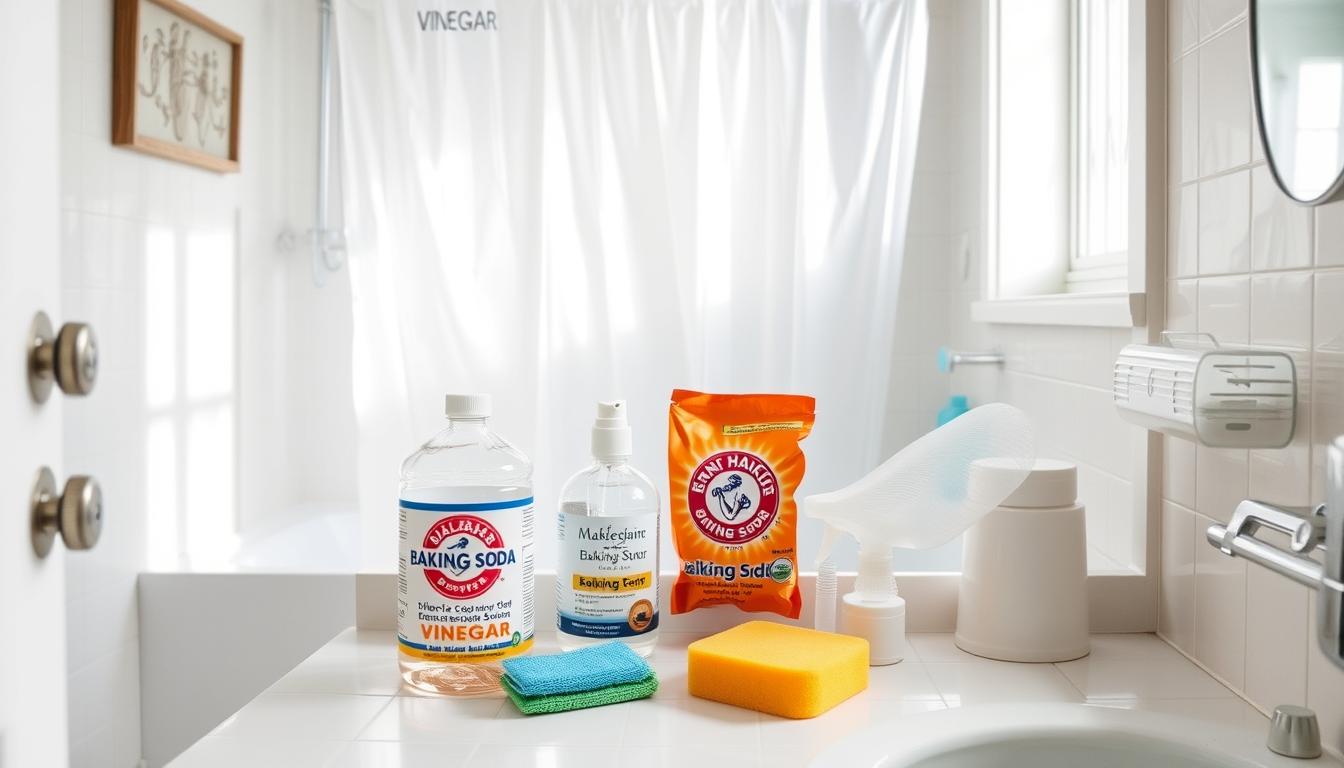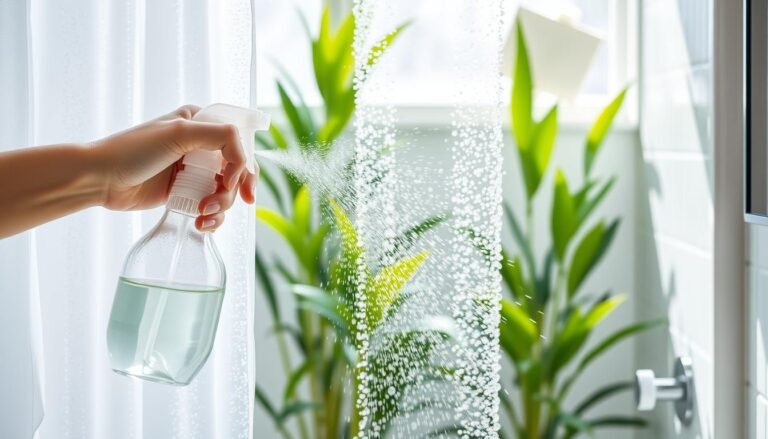How to Clean Plastic Shower Curtain: Easy Tips
Keeping your plastic shower curtain clean is easier than you think. Most people don’t know how simple it is to wash these vinyl curtains. Instead of throwing them out when they’re dirty, you can clean them with easy methods.
If you’ve just bought a shower curtain or have an old one, you can make it last longer. For new curtains, using a pretreatment helps fight off soap scum. Just run it through the washing machine with warm water and a little distilled white vinegar.
There are two main ways to clean vinyl shower curtains: in the washing machine or by hand. With machine washing, use warm water and add vinegar, baking soda, or mild laundry soap. Remember, don’t mix these cleaners together. Then, let the curtain air dry while hanging up.
To handwash, use baking soda and a microfiber cloth for scrubbing. Rinse it with warm water and hang it up to dry. This keeps your shower curtain looking great. It also helps your bathroom stay clean.
Washing your plastic shower curtain removes soap scum and prevents mildew. With regular cleaning, keeping your curtains fresh becomes an easy job.
Why You Should Clean Your Plastic Shower Curtain Regularly
Cleaning your plastic shower curtain often is key to a clean, healthy bathroom. Regular cleaning is very important. Here’s why:
Preventing Soap Scum Build-up
Soap scum quickly gathers on plastic shower curtains. It looks bad and can hold harmful bacteria. To fight soap scum, wash your curtain monthly.
Use the washing machine’s gentle cycle with warm or cool water and some detergent. Adding ½ cup of bleach or color-safe bleach helps remove tough buildup. A weekly spray with a vinegar-water solution keeps the curtain cleaner longer. This routine stops soap scum and grime, keeping your curtain looking new.
Avoiding Mildew and Mold
Cleaning your shower curtain stops mildew and mold growth. These grow in the wet, humid bathroom air. Wash it monthly and vent your bathroom well to fight these fungi.
Experts recommend a weekly vinegar and water spray. This prevents mold and mildew.
Extending the Lifespan of Your Shower Curtain
Keeping your shower curtain clean helps it last longer. It stops soap scum and dirt from breaking down the material too soon. Experts say to hang your curtain out to dry after washing it.
Avoid high-heat drying. Make sure your curtain dries fully after use to stop bacteria and mold growth. By cleaning it often, you don’t have to replace it as much. This saves you money over time.
| Cleaning Technique | Frequency | Benefits |
|---|---|---|
| Washing Machine (Gentle Cycle) | Monthly | Removes soap scum and mildew |
| Handwashing with Soap | Monthly | Effective for deep cleaning and stain removal |
| Vinegar-Water Solution Spray | Weekly | Prevents buildup and deodorizes |
| Air Drying | After Each Wash | Prevents mold and bacteria growth |
Step-by-Step Guide on How to Clean Plastic Shower Curtain
Cleaning your plastic shower curtain is easy. We’ll guide you through a simple step-by-step method. This will keep your shower curtain clean and increase its life. The guide has all you need, from what to use to the best ways to clean.
Materials You Will Need
First, collect these materials:
- Detergent (e.g., Tide Free & Gentle Laundry Detergent)
- Baking soda
- White vinegar (e.g., Aunt Fannie’s Cleaning Vinegar)
- Bath towels
- Chlorine bleach (only for white or transparent curtains)
- Long rubber gloves
- Eye protection
With these items, cleaning your plastic shower curtain will be straightforward.
Removing the Curtain from the Rod
To safely take down the shower curtain:
- Slowly detach the curtain to keep the setup intact.
- Soak any rings or hooks in warm vinegar water to clean off soap scum.
After removing it, you’re all set for the next step.
Choosing the Right Cleaning Method
It’s important to choose the best cleaning method. Here are two main ways:
- Washing Machine Method: Great for most plastic curtains.
- Add the curtain to the washing machine with some bath towels. The towels help scrub off dirt.
- Use a gentle cycle, lukewarm water, and a mild detergent.
- For extra cleaning, add 1/2 cup of baking soda or white vinegar.
- To remove tough stains, mix 1/2 cup chlorine bleach with 1/4 cup detergent. This is for white or transparent curtains only.
- Handwashing Method: Best for curtains that need more care.
- Mix 1/2 cup of baking soda with gentle laundry detergent or mild cleaner.
- Clean the curtain with a sponge, cloth, or brush.
- Rinse well to ensure all soap is gone.
- Make sure the area is well-ventilated to avoid inhaling fumes.
Once washed, hang the curtain in a cool, airy place. Avoid direct heat when drying.
Pretreating Your New Plastic Shower Curtain
Pretreating your new plastic shower curtain is a key step. You should wash it in warm water with ¼ cup of distilled white vinegar on a gentle cycle. This slows down soap scum buildup and helps your shower curtain last longer.
The benefits of this simple action are clear compared to untreated curtains. Now, let’s look at why and how to pretreat your shower curtain:
- Prevents soap scum buildup – Adding white vinegar during the rinse stops scum from forming.
- Delays grime and dirt accumulation – Regular pretreatment keeps your curtain clean for more time.
- Extends shower curtain life – Frequent pretreatment improves your curtain’s durability.
After the rinse, hang your curtain to dry. This avoids damage that drying machines can cause. This way, your curtain stays in good shape and works well. Including these easy steps in your care routine ensures your curtain stays clean and lasts longer.
| Steps | Benefits |
|---|---|
| Rinse with ¼ cup of white vinegar | Prevents soap scum buildup |
| Hang to dry on the rod | Maintains shape and prevents damage |
Using the Washing Machine Method
Washing plastic shower curtains is easy with your washing machine. First, take down the curtain and put it inside the machine. Add a few white towels for added scrubbing power and to keep the load balanced.
Choose a gentle wash cycle with warm water to clean without harm. Use mild detergent, or add a bit of bleach for tough dirt. Always follow your washing machine’s instructions.
Once washed, quickly take out the curtain and shake off extra water. It’s best to hang it to dry on the rod to prevent damage. Using this method keeps your bathroom clean and is very straightforward. For more shower curtain cleaning tips, check out this helpful guide.
Adding baking soda or white vinegar can boost cleaning power. They’re great at removing soap scum and mildew. Add some Arm & Hammer Baking Soda to your wash, or use Lucy’s Distilled White Vinegar for daily sprays. Regular cleaning, ideally once a month, keeps your curtain fresh.
It’s safe to wash shower curtains in both types of machines. But, air dry them to keep them in good shape. Cleaning often and doing daily touch-ups helps avoid mold and extends your curtain’s life.
Handwashing Your Plastic Shower Curtain
Handwashing your plastic shower curtain can keep it looking clean. It’s an easy and effective way to remove stains. This guide focuses on scrubbing and rinsing techniques.
Scrubbing with Baking Soda
First, spread your plastic shower curtain flat in a large space, like the bathtub. Mix 1/4 cup of baking soda with laundry detergent. Baking soda is a soft abrasive, perfect for removing stains from your curtain.
Use a sponge or soft brush to apply the mix to the curtain. Scrub it well, paying extra attention to stained spots. If the curtain is very dirty, let it soak in warm water with the cleaning mix for a bit.
Proper Rinsing Techniques
Rinsing well is key to preventing new dirt from sticking. Use warm water to rinse the curtain, making sure there’s no baking soda or detergent left. If the curtain is still dirty, scrub and rinse again until it’s clean.
A final rinse with a vinegar solution can remove any left soap scum. Mix one part vinegar with four parts water. Hang the curtain to air dry afterward, stretching it to avoid wrinkles.
Cleaning your shower curtain often keeps it fresh and extends its life. Add ½ cup of baking soda and ¼ cup of vinegar when rinsing for more mildew protection. For more bathroom maintenance tips, visit this link.

Hey there, I’m Alex Hanson and I’m passionate about all things covers! Whether you’re looking for a car seat cover to protect your vehicle or an oven cover to keep your kitchen clean, I’m here to help. With years of experience in the industry, I have plenty of knowledge and insights to share with my readers. So, if you care about protecting your belongings and making them look their best, you’re encouraged to read my blog as I explore the perfect cover for every need.







